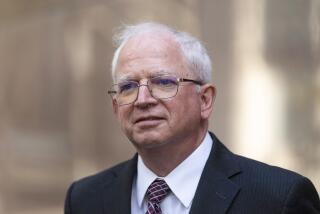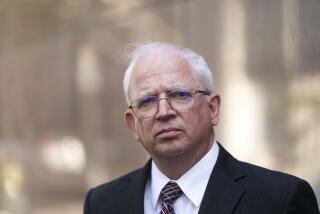Hedgecock Side Rests Without Calling Witness
- Share via
SAN DIEGO — In a dramatic development that stunned courtroom observers, the defense in Mayor Roger Hedgecock’s felony retrial rested Tuesday without presenting a single witness.
Hedgecock defense attorney Oscar Goodman of Las Vegas made his announcement shortly before noon, just 10 minutes after Deputy Dist. Atty. Charles Wickersham, who presented 61 prosecution witnesses over 17 days, rested his case. Because Yom Kippur, a Jewish holiday, and the judge’s schedule conflict, closing arguments in the case will not be heard until next week.
After a brief recess in which he conferred with Hedgecock, Goodman told the eight-woman, four-man jury, “If it please the court, ladies and gentlemen of the jury, Mayor Hedgecock rests.” Wickersham reacted with a dazed expression, while several of the jurors leaned back in their chairs and raised their eyebrows.
In explaining his move to reporters afterward, Goodman described the prosecution’s case as a “sand castle . . . that crumbled.”
“It’s very clear to us that the prosecution has not met its burden of proof beyond a reasonable doubt,” he said.
Hedgecock is being tried on 15 felony conspiracy and perjury charges, alleging that he participated in a scheme in which Nancy Hoover and J. David (Jerry) Dominelli, former principals in the now-bankrupt La Jolla investment firm of J. David & Co., funneled tens of thousands of dollars in illegal contributions to Hedgecock’s 1983 campaign. The illegal funds allegedly were channeled through a political consulting firm owned by Tom Shepard, a close friend of the mayor.
Disclosure Statements
Prosecutors contend that Hedgecock intentionally falsified financial disclosure statements to conceal the transactions, as well as improper personal financial aid from the two former J. David executives. Hedgecock, a 39-year-old moderate Republican who probably would be ousted from office by conviction on any of the felony counts, also is accused of a single misdemeanor conflict-of-interest charge.
Prosecutor Wickersham admitted he was caught off guard by Goodman’s maneuver.
“I’m surprised they didn’t put on a case, quite frankly,” Wickersham said.
However, he dismissed Goodman’s comments about the weakness of the prosecution’s case as “just propaganda for the hallway.”
The mayor’s first case ended in a mistrial last February, with jurors deadlocked 11 to 1 in favor of conviction. Hedgecock testified for three days in his own defense at that trial, but most of the jurors interviewed afterward said they found Hedgecock’s testimony unpersuasive.
Acknowledging that he and Goodman had previously discussed the possibility of not presenting a defense, Hedgecock explained that the two finally concurred on the decision after Wickersham chose to conclude his case by presenting a transcript of an interview with Hedgecock by the state Fair Political Practices Commission.
“That interview . . . explains my point of view on many of these points,” Hedgecock said. “I don’t think I need to repeat it and waste everybody’s time. My testimony is in evidence.”
The case against the mayor turns on one major question: Was the more than $360,000 that Hoover and Dominelli invested in Tom Shepard & Associates in 1982 and 1983 a legitimate business investment or an illegal subsidy to Hedgecock’s campaign designed to circumvent the city’s $250-per-person contribution limit?
Because Hedgecock was the Shepard firm’s major client during most of the period in which the two former J. David executives pumped money into it, prosecutors argue that those investments were tantamount to illegal donations that helped prop up Hedgecock’s campaign in the special 1983 race, prompted by former Mayor Pete Wilson’s election to the U.S. Senate. Last November, only seven weeks after his indictment by the San Diego County Grand Jury, Hedgecock was reelected to a full four-year term by a convincing 58%-42% margin.
The defense, however, characterizes the $361,500 that Hoover and Dominelli invested in Shepard’s firm as a routine business investment designed primarily to help Shepard start his own business, not to get Hedgecock elected mayor.
In response to the prosecution’s contention that the consulting firm “lost” money on the Hedgecock campaign, Goodman argues that Shepard treated the account as a “loss leader” in an attempt to enhance the reputation of his young firm, founded in January, 1982. Under the defense’s theory, Shepard was willing to absorb a short-term financial loss on the Hedgecock campaign, realizing that running a successful mayoral race would act as a magnet for other clients, which, in fact, proved to be the case.
More to Read
Sign up for Essential California
The most important California stories and recommendations in your inbox every morning.
You may occasionally receive promotional content from the Los Angeles Times.













